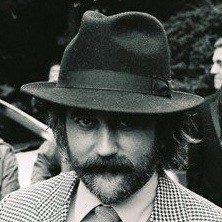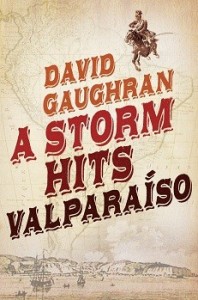
David Gaughran is the author of the South American historical adventure A Storm Hits Valparaíso and the short stories If You Go Into The Woods and Transfection, as well as Let’s Get Digital: How To Self-Publish, And Why You Should.
Born in Dublin, he currently lives in Stockholm, but spends most of his time traveling the world, collecting stories. He runs the popular publishing blog Let’s Get Digital. This is one blog I highly recommend all indie writers follow.
He also has the history blog South Americana, writes a regular column for Indie Reader, and his work has been featured in the Huffington Post, the Irish Times, and The Sunday Times.
David tends towards “big” stories, even in his shorter pieces. “As a kid, I loved the cold war spy stories where the first chapter featured a secretary in the Politburo in Moscow, the second had some farmer in Idaho, and the third was a cab driver in New Delhi. Part of the fun, for me as a reader, was figuring out how all those narrative strands were going to come together. I also love densely plotted stuff, where a character’s life can be turned upside down in a few pages, or where you feel like you’ve lived someone’s eighty-odd years by the end of the book, rather than experiencing episodic snapshots. I suppose it was natural that when I began writing seriously, my work would reflect that. I also don’t like covering familiar ground. I tend to set my stories in somewhat unusual places – Sweden, the Czech Republic, or South America in the 1800s – and I try and play with readers expectations a little, which can mean twists, unexpected sub-plots, or things resolving in an unfamiliar (but hopefully satisfying) way.”
He says writing “bigger” stories brings its own problems. “It’s hard to compress a sweeping narrative – covering seven primary characters, an army of minor ones, and spanning a decade or more – into a single standard-sized book without running into problems such as info-dumping, telling rather than showing, or similar banana skins which can create distance between the reader and the characters, and, ultimately, the story.”
David believes writers must balance showing and telling in their writing. As he explains it, “The challenge is to keep the tedious or routine off the page, compress the parts that don’t deserve top billing, but to also make sure that your character is a fully fleshed-out person, and not simply a Zelig-like device for you to string one fantastical scene after another.”
In early drafts , he says he can sometimes lapse into too much telling. “I usually catch most of that stuff on successive drafts, and layer in all the detail needed to anchor those conversations and scenes, and turn those chunks of ‘telling’ into action or dialogue, or something a little more artful, but if I could nab that stuff earlier in the process, or deal with it in less drafts, I would be able to write a hell of a lot quicker.”
Time management is the part of being an indie author he finds most challenging. “There are so many potential distractions. Aside from the obvious (Twitter, Facebook, checking your sales), there is a strange part of the indie writer’s brain that feels guilty for switching off the internet and actually doing your primary job–writing–as you feel you should be out hawking your books somewhere. Then someone comes along and says something like ‘Hey, have you heard about Pinterest? It’s the latest way to connect with readers!’ and you feel either that you’ve been promoting all wrong and haven’t given your book a chance, or just tired from all the options out there.”
David say though, that all the angst over social media networking and marketing is unnecessary. “Really, the best promotion is releasing a new book, and that’s true for any writer. So, if you want to sell more, write more. And don’t get down about all the things you are ‘supposed’ to do. The only thing you are supposed to do is write. Aside from that, only do what you enjoy. And if you want to really carve out writing time, download Freedom – it blocks the internet for whatever time you set. I downloaded it at the start of February and wrote over 50,000 words that month. I couldn’t believe it.”
This advice comes from his own experience. As David puts it, when he first started out, he was everywhere—Goodreads, LibraryThing, MobileRead, KindleBoards. “You name it, I was there. But after a few months, I realized that I wasn’t enjoying myself. So I stick to what I enjoy: blogging, Twitter, and Facebook. And I don’t say ‘Buy my book!’ in any of those places. I just have conversations. Social media is all about connections. Promo messages don’t work. Conversations, however, lead to connections, which will ultimately sell books, if you’re patient, and genuine, and not having faux-conversations with the real intention of hitting them with a promo message down the line.”
He subscribes to Seth Godin’s maxim that it’s far easier (and cheaper) to design marketing into a product than to advertise it afterward. He says, “That means a quality cover, proper editing, an enticing blurb, and making sure that sample is going to hook the reader. Too many indies skimp on covers and editing, don’t sell, then waste money on ads that won’t work because their covers aren’t good enough, or the reader samples and can see the book hasn’t been edited to a professional standard. Some indies seem to think that their only competition is other indie work. It’s not! You’re up against the biggest books from the biggest publishers! Make sure your book won’t look out of place beside them.”
As for direct promotion, David says he’s tried a little of everything. He found the most effective strategies were using “free” in a targeted way, running a limited time sale, and targeting the right ad to the right reader site. “I’m a big fan of avoiding things that require continual work (posting in Amazon Kindle Facebook groups, or on reader forums), and focusing on things that require a one-time effort (asking for reviews at the back of your books, having a mailing list sign-up at the back of your books). I generally find they are more effective and free up more writing time. I think many of the indies that complain about the self-promo treadmill should consider breaking things down along similar lines.”
As you might expect, David is a big supporter of the Indie author movement and especially appreciates the atmosphere of mutual support and assistance. “I think it really pays to keep in touch with the community. While the large publishers have the advantages of scale and resources, they can’t come near us on speed. Once they have figured out something like cheap pricing on the first book in a series, we’re two things ahead of them. The whole community is a wonderful example of the power of crowdsourcing and sharing results of experimentation. No publisher can be as nimble as a self-publisher, and there’s a whole army of us trying new things every day and sharing results openly. It’s our greatest strength.”
In the course of his own development as a writer, David has attended quite a few workshops, but says he’s never been that keen on writing groups. “I write very much with the door closed. While I do sometimes share unedited excerpts on my blog, they have been through multiple drafts and beta readers before I let anyone see it.”
He says the biggest development for him as a writer has simply come from reading continually, and writing over and over again until he “got” it. He credits Stephen King’s On Writing as the book that finally changed him from someone who always talked about writing something… someday… to someone who actually wrote a book.
His advice to aspiring writers? “Don’t worry about how you are going to publish until your book is done. Write the book you want to read, don’t write the book you think you should be writing (whether that’s for commercial reasons, or to chase a trend, or because you want to be taken seriously, or whatever). You have to be passionate about your story. You have to believe in it. Write the book you want to read. It’s the best advice I ever got. Don’t worry that there won’t be enough readers. In the Digital Age, every niche can be profitable, if you do it right.”
 David’s latest book is A Storm Hits Valparaíso:
David’s latest book is A Storm Hits Valparaíso:
Catalina Flores de la Peña’s tongue got her in more trouble than any other part of her body, even though there were far more likely candidates. But when a storm rolls into her sleepy port town, she finds herself embroiled with a gang of adventurers, mercenaries, and prostitutes on a journey to free South America from the Spanish Empire.
A Storm Hits Valparaíso is an epic historical adventure starring two brothers torn apart by love; a slave running for his life; a disgraced British sailor seeking redemption; and José de San Martín, an Argentine general who deserts the Spanish Army to lead a bloody revolt against his former masters.
This title is available from Amazon. Learn more about the fascinating David Gaughran and his other books from his Amazon Author page. Be sure to check out his excellent blog Let’s Get Digital, as well as his history blog. You can also find David on Facebook and follow him on Twitter.
[subscribe2]

Great post David. I'd like to know how you came to pick Idaho as a place a farmer would come from for your cold war spy story, chapter 2? Had you ever been there or just read about that particular state in a book/magazine? I ask because that is where I grew up and graduated high school and attended some college. It is where I went into the military during the cold war in the early 1980s and where I am getting ready to move back to.
Also, did you ever find out if the Gallery Bellman was still there in Stockholm and open and who runs it by any chance 🙂
Thanks Jacqueline. The "Idaho" comment was merely an example of how the cold war spy stories I read in my youth contained multiple narrative strands which left you guessing how they would all come together. I guess that kind of stuff left a big impression on me as they are still the kinds of stories I seek out as a reader and a writer.
As for the Gallery Bellman, I wasn't able to find it. Although, that could be down to my lack of sleuthing/Swedish skills rather than any indication it's no longer open.
I got a lot for King's "On Writing" too.Good book.
It's really great. I think any writer would get something out of it, but it's particularly recommended for those starting out. It really got me going.